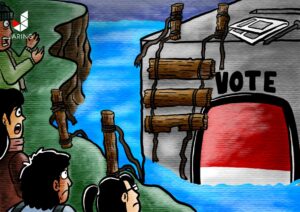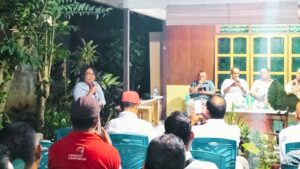Political parties are active on various social media, such as TikTok, which is currently popular with young people. The eighteen-second video, for example, shows five women with typical attributes of the Prosperous Justice Party (PKS). They danced on the side of the road to the musical accompaniment set in sequence.
By adding the caption for the contest Lomba TikTok Go PKS Go Bersama Dr. Salim Segaf (TikTok Go PKS Go Contest with Dr. Salim Segaf) and various hashtags, like #SenamGoPKSGo #BugarBersamaDrSalim #Milad20PKS, this video belonging to @dr.auliyahfadlilah has been viewed for 1.9 million times. As of Monday, July 25, 2022, this video was able to garner around 56.8 thousand likes and attracted people to post 6,574 comments.
With such a large number of views, this video occupied the top position when we wrote in the search field with the keyword “PKS.” Apart from TikTok, this viral content was also spread across several other social media platforms, such as Twitter, Instagram, and Facebook.
Some politicians also go all out on social media, and create similar contents. Ahmad Syaikhu is one of them. The member of the House of Representatives of the Republic of Indonesia (DPR RI), who is also the General Chair of the PKS, actively uploads his activities through the syaikhu_ahmad_ account.
On July 2, Syaikhu shared a video with his wife before the Eid al-Adha celebration. Although not as viral as Auliyah’s, this content is quite interesting, thus attracting social media users to play it 1830 times. This is because the politician accompanies this thirteen-second video with the words “Find Sacrificial Animals with Girlfriend.” Syaikhu so far has uploaded at least 58 contents and has 4551 followers.
Head of Public Relations of PKS, Ahmad Mabruri Mei Akbari said that the number of millennial and generation Z groups on social media was very large, so it was natural for PKS to adapt to social media developments. “We see the development of social media platforms that are increasingly popular. Then, the growth of TikTok is extraordinary, especially among the Millennial Generation and Gen Z,” said Mabruri to Jaring in an interview on July 14, 2022.
PKS is very serious in content creation. The party even launched a jingle containing the voice of Ahmad Syaikhu and accompanied by Sound of GK (Garuda Keadilan)—a band that likes to cover songs on Youtube. With the hashtag #goPKSgo, the song created by Raden Agung has been used by PKS politicians and sympathizers to create social media content. Auliyah’s video is among the traffic-affected ones from this trend.
According to Mabruri, PKS can produce 2-3 contents in two weeks. “For the content in the PKS account, we have our dedicated team, which is part of the central executive board,” he added. In this way, PKS seeks to introduce politics to the younger generation through various social media platforms. “We observe that in 2024, 60 percent of the voters are the younger generation. Therefore, to get into their souls, into their communities, we have to use the tools they use,” he added.
PKS is one of many political parties, such as the National Awakening Party (PKB), the National Mandate Party (PAN) and the Democratic Party, which are quite active in social media. With social media, the central executive board (DPP) of PAN seems to often involve a number of people who have many followers, such as comedian Denny Cagur, singer Gita Sinaga, and guitarist Enda Ungu to attract sympathy through populist issues, starting from broadcasting their support for micro, small and medium enterprises, to vaccination programs.
PAN’s TikTok account has more than 15 thousand followers. Almost all videos are watched thousands of times. Through an application that is popular among young people, PAN often comments on issues that are getting public attention. One of them is the procurement of curtains for the official residence of members of the House of Representatives (DPR) and the controversy related to Singapore’s rejection of Abdul Somad. The video was observed to have been played nearly 300 times.
Deputy Chairperson of the PAN central executive board, Viva Yoga Mauladi, said that his party was eyeing young voters through social media. The number is estimated to be more than half of the total voters in the 2024 General Election. “The niche is very large,” he told Jaring.id in an interview on Friday, May 13, 2022.
Based on the observation of Jaring.id, social media content by political parties generally follows the latest trends, such as dancing to the accompaniment of a viral song, involving women as the content objects, or capturing personal activities with family.
The desire of some political parties to seduce young voters from the circles of Millennial and Generation Z is reasonable. The dominance of young voters in the next election, becomes the main basis for parties and political actors, flocking to create content, and compete with other creators.
The results of the 2020 Population Census show that the majority of Indonesia’s population is dominated by Generation Z and Millennials. The proportion of Generation Z (who were born between 1997 to 2012) is 74.93 million people or 27.94 percent, followed by Millennials (who were born between 1981 to1996) with as many as 69.38 million people or 25.87 percent. The total population of Indonesia reached 270.20 million people as of September 2020.
Meanwhile, since its launch in 2016, the TikTok application by ByteDance Technology has captivated many users. Based on data from Insider Intelligence, Tik Tok users in Indonesia penetrated 92.07 million accounts with an average age of the users of between 18 to 24 years. Meanwhile in Southeast Asia, the number of TikTok users reach 240 million people. Across the country, it might be as many as 755 million by 2022.
Moch Rizky, a lecturer in Communication Studies at Ciputra University, Surabaya, is not surprised by the high number of TikTok users. Because, according to him, TikTok is able to detect what users are interested in. “Because TikTok can find out which videos we like based on what we watch on our smartphone. So, users will like to open TikTok because they are immediately presented with videos that they want to watch,” he explained.
That way, TikTok content can be seen by more users who have liked similar content through the “For You Page.” FYP TikTok is an algorithm that allows trends or videos that are currently busy to appear and be viewed on the main page of the TikTok account, without having to follow the account. This also makes viral content on TikTok easy to discuss through other social media. “If we observe, it is very common for videos that are spread on Instagram or Twitter to be videos that come from TikTok,” he said.
The regional executive board (DPD) of the Nasdem Party of Bandung city also wants to make use of the advantage of TikTok. In a day, the administrators can present two to three contents. As for the theme of the content, it usually follows whatever is trending, such as the dance trend of Nayeon-Pop songs. When compared to all accounts of political parties, Nasdem Bandung is the only one that follows this trend.
Rhyma Permatasari, Deputy Head of Media and Communication at the party’s DPD of Bandung, said that trends are the main basis for his party to create content. “Obviously, we have to be aware of trends and what young people are interested in, because coincidentally, there are a lot of young people in Nasdem in Bandung, so it will be easier to get insights into what young people are interested in during the formulation process of the content,” she explained to Jaring.id through an online interview on Thursday, July 14, 2022.
She also hopes that the party’s electability in the upcoming 2024 General Election can be boosted through social media. “We see a shift in accessing information in this era, so using social media is the most rational and effective way for us to deliver information related to the Nasdem party,” Rhyma explained.
In addition to building the party’s image, social media is considered quite effective as a regeneration tool. “Everyday, we always get verification requests from young people who want to join Nasdem cadres through links on social media,” she added.
In content creation, Rhyma and Mabruri both answered that they did not have a special allocation of funds, let alone using political party aid funds. The cost of production and purchase of tools comes from voluntary donations from cadres. Likewise, Mabruri acknowledged this.
On the other hand, the regional executive board of Nasdem in Surabaya utilizes political party assistance funds to produce social media content. Unang Noer, Deputy Chairman of the DPD Nasdem of Surabaya, considers the process of producing social media content as an effort by the party to provide education to cadres and the public. “There are cash aid or funds for political parties. You can check it by yourself later. We get the funds from the party’s central executive board. It is allocated for political education, including to manage contents of the party on social media). This is one of the outputs,” Unang concluded.
Danang Widoyoko, Secretary General of Transparency International Indonesia suggested that parties use other sources of funds to produce social media content. So far, according to him, political parties have had two types of assistance from the state. The first is political party aid funds that come from the government and campaign funds managed by the General Elections Commission (KPU).
Under the provisions of the 2011 Political Party Law, parties can receive assistance based on the number of votes they received in the last General Elections. In the last Presidential Election, the Indonesian Democratic Party of Struggle (PDIP), for example, was entitled to pocket Rp 27.5 billion because it received the most votes. PDIP was followed by the second largest, namely the Great Indonesia Movement Party (Gerindra) with Rp 17.5 billion, the Golkar Party (Golkar) with Rp 17.2 billion, and the National Democratic Party (Nasdem) with Rp 12.6 billion.
Article 5 paragraph (1) of the Political Party Law states that political parties are entitled to receive assistance of Rp 1000 for each vote they win. However, this financial assistance is not free money. Article 12 of the Home Affairs Minister Regulation (Permendagri) Number 6 of 2017 stipulates that political parties must spend at least 60% of the political aid funds for political education. Political education is a process of learning and understanding about the rights, obligations and responsibilities of every citizen in the life of the nation and the state.
“This political party assistance fund is for office operations, electricity, staff salaries and so on, including political education. This is different from the campaign funds that are managed by the KPU,” Danang explained on July 7, 2022.
Therefore, according to him, the funds are not supposed to be used to create social media content. “Political education is carried out by holding training to learn and understand about the rights, obligations, and responsibilities of every citizen in the life of the nation and state. Creating this (TikTok content) does not include political education,” said Danang.
“Unfortunately, if this regulation is violated, there is no written sanction for political parties,” he added.
Viral ‘fever’ is widespread to Southeast Asia
TikTok’s unique algorithm is one of the reasons why going viral is so crucial. It promotes content based on user interaction, interest and exploration in the application, making it more profitable compared to other social media. This algorithm allows to increase the number of views through organic promotion. This technique makes TikTok capable of becoming a strategic political tool. It can even create audiences outside Southeast Asia to be actively involved in certain content.
Malaysia and the Philippines also experienced the same viral symptoms. The use of the platform is no longer a matter of building a good image, but it can also be a means of mobilizing the masses, and a forum for gaining votes. It is so effective that it can even bring a candidate pair to become a president regardless of past sins.
Ferdinand Marcos Jr. or better known as BongBong, succeeded in occupying the seat of President of the Philippines, even though he was a son of a dictator. Marcos is quite active on TikTok. Inaugurated last May, Marcos will replace President Rodrigo Duterte until 2028.
Many thought that Marcos’ victory was the result of utilizing social media, especially TikTok. The pattern is almost the same as that of politicians in Indonesia. Showing his closeness to his family, showing that he is an authoritative and very nurturing figure, so that people who visit the Marcos’ TikTok page will instantly forget their family background and their relationship with dictatorial power.
According to the Secretary General of the Asia Democratic Network, Ichal Supriadi, what Marcos did was systemic work. This is not only done by Bongbong in cyberspace. “Virality is an additional instrument in determining victory, when compared to his political opponents, Marcos has fewer followers, but several factors such as behind-the-scenes support are also strong. So, TikTok is not the only determining factor for his victory,” said Ichal.
“Content is also a factor that determines voters fall in love, basically politics is not good people against bad people, but this is a war of resources,” he added.
Marcos’ victory reflects how Filipino voters have become complacent with the image that a politician has built. With 30 million votes, Marcos Bongbong succeeded in re-appointing his family’s dynastic throne at the Malacanang Palace. Bongbong seemed to clean up a bad history for his father Ferdinand Marcos Sr, who served from 1965-1986.
The past crimes of Marcos Sr. seemed to just disappear, even though during his leadership in the Philippines, there were many violations of human rights, such as killings and enforced disappearances for opposition parties who opposed his orders.
Opposition leader Benigno Aquino is one of the most aggressive figures against the Marcos Sr. regime. After his flight from America, Benigno wanted to restore democracy to his country, but the decision to return to the Philippines was a big mistake, because while in Manila, Benigno was shot dead right after the plane landed. What happened to Benigno was one of the triggers for the protests, and the Marcos Sr. regime was then demolished by the people themselves.
During his tenure, the Marcos family was inseparable from corruption. Marcos’ wife, Imelda, is noted to have spent state money on branded clothes. Bongbong himself used his family’s wealth to start his political career and returned from his family’s exile in Hawaii.
The Milk Tea Alliance movement is proof of how TikTok can be a double-edged knife. If Bongbong succeeds in erasing the dark history of his father and family, the Milk Tea Alliance movement, hereinafter referred to as MTA, is a form of successful collective work against authoritarianism in Asia.
This movement was born through long demonstrations in Hong Kong and Thailand. Hong Kong previously resisted the domination of Bangkok and was then followed by demands for the implementation of democracy in Bangkok, Thailand. Soon later, large demonstrations against the military coup broke out and continued to reverberate. Departing from the same struggle, namely pro-democracy, a non-formal movement based on social media campaigns emerged, namely MTA.
Although born from Twitter tweets, the MTA movement also continues to spread to other platforms, including Tiktok. Collages of photos of protests from Hong Kong, Thailand and Myanmar are widely distributed. Even this collective power urges ASEAN to use its bargaining power, at the national and regional levels, to bring about change.
Similar conditions, but not the same, are also mushrooming in Malaysia. Siti Aishah Shaik also uses Tiktok as a tool to transmit information and opinions on state conditions. However, the former Malaysian Senator was reported to the police for criticizing the government’s decision through his TikTok account, which has 30.8K followers.
At that time, the Head of the Heroine of the People’s Justice Party (PKR) expressed her opinion about the sudden increase in some staples and other commodities. She also criticized the reduction of subsidies in Malaysia, which took effect last July 1. (Reka Kajaksana & Agetha)







